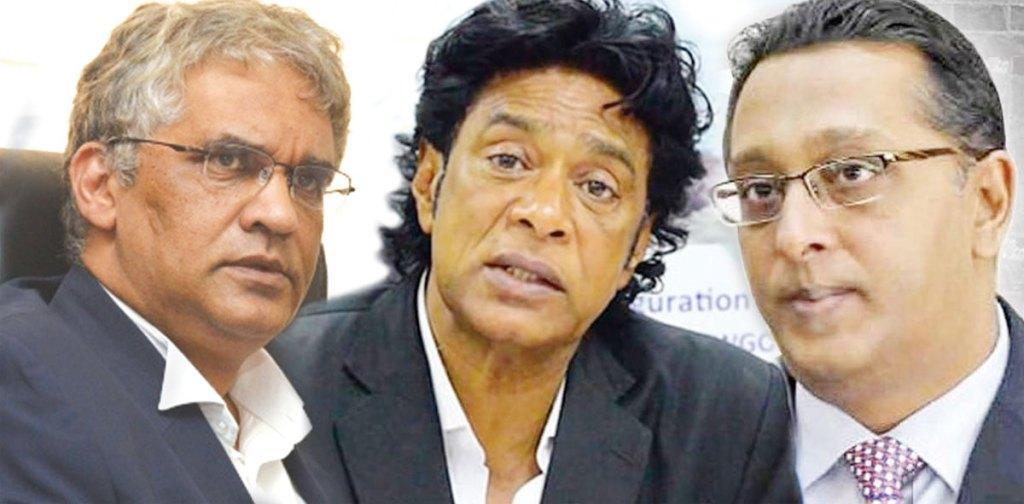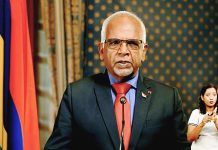Africa-Press – Mauritius. The political news this week was mixed: traditional parties remained particularly discreet while extra-parliamentary parties were very present in the news.
As for the traditional parties, it seems that last week’s ministerial reshuffle has calmed the enthusiasm of the opposition alliance. While they were very present in the media and on the ground for the preparation of their various congresses, they now seem to be much further behind.
In fact, the leaders of the PTr, the MMM and the PMSD appear to have been surprised by the “timing” and the nature of this reshuffle, and we can easily guess that they must be reviewing their own strategy.
By once again postponing the municipal elections, the Prime Minister suggested that the general elections were fast approaching and, by carrying out the cabinet reshuffle, he sent the message that the general elections are not coming soon.
In fact, Pravind Jugnauth still manages to control the political agenda. He had done exactly the same thing before the 2019 elections. On the one hand, he had not fielded any candidate in the partial of number 18 on December 17, 2017 which had seen the election of Arvin Boolell.
This allowed him to gauge the balance of power between the other parties without revealing his cards. And, on the other hand, he announced a by-election to constituency number 7, after the resignation of Vishnu Lutchmeenaraidoo.
This partial was to be held on November 13, 2019, and we all know that Pravind Jugnauth had taken the entire opposition by surprise by organizing the general elections on November 7, 2019, a few days before the scheduled date of the partial.
Control of political time is an essential weapon if we want to have control over the chessboard, and it seems for the moment that the opposition’s attempts to impose its own rhythm by putting pressure on the government didn’t work.
Thus, they find themselves obliged to keep this alliance alive and to make it grow in the next 15 months. This does not mean that the next elections will take place in November next year.
In fact, they may well be held at any time following the Privy Council’s verdict. And we can guess that the MSM will raise and lower the mayonnaise over the coming months in order to wear down the opposition.
The latter will therefore have to remain vigilant. . . For their part, the extra-parliamentary parties were very active this week. Nando Bodha, Rama Valayden and their comrades welcomed the Citizen Rally for the Fatherland and the Fraternal Greens of Sylvio Michel into their ranks.
They took the opportunity to rename their alliance to Linion Moris. Whether we believe in them or not, Linion Moris has the merit of trying to construct a political proposal that can fit into the Mauritian political landscape.
There are obviously some well-known faces, like Bodha and Valayden, but there is also a significant proportion of new ones, which is necessarily positive.
Nando Bodha and Rama Valayden are also seasoned in grassroots politics, which will greatly help newcomers like Parvez Dooky from Ralliement Citoyen pour la Patrie, a Paris-based party that has a grand total of three members in its ranks.
ranks. In any case, Linion Moris is putting himself in working order and sending the signal that we will have to deal with them for the next electoral deadlines. The same goes for Roshi Bhadain and Patrick Belcourt.
The Reform Party has just welcomed new members and even displayed a choice recruit during the youth congress organized last Sunday by the Reform Party and En Avant Moris.
Géraldine Geoffroy, star host of Radio One, appeared alongside Roshi Bhadain. Rumors of a resignation from the Radio One host had been circulating for a while.
By appearing last Sunday, Géraldine Geoffroy cut short the rumors and clearly declared her intention to become politically involved. She should even be Roshi Bhadain’s running mate at number 20, which could make for a particularly strong duo.
It is undeniable that Géraldine Geoffroy is an intelligent, charismatic and popular young woman. She is part of this line of media personalities who have taken the step towards active politics with certain electoral success (as proven by Subhasnee Luchmun-Roy and Sandra Mayotte for the MSM).
As a result, we should expect that a Bhadain/Geoffroy duo could really hurt number 20. Mauritius at the G20 This year’s G20 summit will be held on September 9-10. This grouping of the 20 most powerful countries in the world constitutes an annual mass closely followed by the whole world.
This is the first time that such a summit has been held in India, which chairs the G20 until December 1, the date on which Brazil will take over the presidency of the group.
This group of the 20 most powerful countries on the planet actually includes the 19 most powerful countries in the world as well as the European Union bloc (but where certain countries are excluded from membership). These countries alone constitute 80% of global wealth, 75% of international trade and nearly 2/3 of the world population.
This summit is above all an opportunity for the leaders of world powers to discuss the future of the economy and global cooperation, in parallel with representatives of institutions such as the United Nations, the IMF, the WHO, the WTO or even the OECD.
This year’s discussions are expected to follow in the footsteps of the last summit held in Indonesia last year, and are expected to focus on issues related to post-Covid recovery, global inflation, war in Ukraine and global warming.
The recent opening of BRICS to six other countries will probably also be a subject discussed extensively by the representatives of the countries and institutions present in New Delhi this weekend.
As tradition dictates, the organizing country also has the choice of inviting certain non-member countries of the group to attend the summit and this year is no exception to the rule.
Thus, in addition to the active members of the G20, Indian Prime Minister Narendra Modi extended an invitation to Bangladesh, Egypt, the Netherlands, Spain, Singapore, Nigeria, Oman, the Arab Emirates United and the Republic of Mauritius.
The Mauritian flag will fly high and proud among those of the world economic elite for a highly symbolic weekend. Beyond the communication exercise for the Mauritian government and for Prime Minister Pravind Jugnauth, this is in reality an extremely interesting opportunity for our country.
It is extremely important for Mauritius to continue to build strong diplomatic ties with countries which are today the “drivers” of the world economy.
Thus, such a summit is the perfect opportunity to promote our national interests to leaders like Rishi Sunak, Joe Biden, Cyril Ramaphosa and Olaf Scholtz.
Emmanuel Macron and Prince Salman of Saudi Arabia could also be present at this summit, despite the withdrawal of Vladimir Putin (no doubt because of the international arrest warrant issued against him) and the absence of Xi Jinping.
Mauritius will thus have the opportunity to discuss directly with world decision-makers subjects as pressing and important for us as the Chagos issue, the restructuring of the national debt, regulations linked to “cryptocurrencies” or even the question of security.
food and energy. Thus, the presence of Mauritius at this summit must go beyond the simple symbol so that we can directly address the issues that are ours today to the decision-making players of the global economy.
Xi Jinping absent from G20 summit in India While the recent BRICS summit heralded a new era of unprecedented cooperation between China and India, relations suddenly cooled this week.
The reason: a map of China where parts of India, parts of Russia and the Vietnamese, Taiwanese and Japanese EEZs appeared as part of Chinese territory.
The Indian government’s reaction was immediate with a military exercise carried out in the Ladakh area in the Himalayas. Since the 1962 conflict, this region has been a significant area of friction between the two nuclear powers.
The last open conflict took place in 2022, with a serious incident apparently causing several hundred deaths in 2020. Moreover, the pacification agreement which followed this first conflict had stipulated that there would be no more use of firearms between the two belligerents, which explains why Indian and Chinese soldiers fought.
stabbed in 2020. Once again, everything suggested that relations between these two countries had warmed up in recent months with their common desire to begin the dedollarization process and the extension of BRICS to six new members.
This cooling therefore appears to be a major surprise, especially since Xi Jinping has already announced that he will not go to the G20 summit which is being held in India at the end of this week.
So all of this appears to be a big contradiction sending mixed signals to the world. On the one hand, they want to build an alternative to the hegemony of the Dollar over the world economy and, on the other hand, they beat each other over territorial disputes.
Such postures could, on their own, derail the BRICS+ project by undermining the confidence of their various partners. This actually demonstrates above all the fact that the BRICS+ project rests on extremely unstable ground.
As mentioned the week before, there is currently no real BRICS+ union, apart from the dedollarization project. There is no security, geographic, historical, cultural, religious or linguistic unity allowing these countries to find common ground that goes beyond simple, purely economic interests.
It turns out that China and India are, de facto, the two locomotives of the BRICS since they are the two countries whose economies need the BRICS the most to continue to grow. But these contradictions are likely to last; It’s inevitable.
Between China’s expansionist desires on the one hand, and the pragmatics of the “middle-way” of Indian diplomacy on the other (where India works just as much with its Western partners as with the BRICS+), there is there will inevitably be friction between these two countries.
And it will be up to political leaders and diplomats to mitigate things and find ways out. We can guess that things will return to normal between these two countries, and that economic priorities will take over.
But we cannot help but think that the publication of this map by the Chinese, which produced the Indian reaction, is necessarily part of the desire to embarrass the Indian ally to whom the world will look during the G20 summit.
.
. Summit where China will shine through the absence of its leader. . .
* * * Coup d’état in Gabon: the collapse of Françafrique continues
On August 30, following the presidential elections which saw the re-election of Ali Bongo for a third consecutive term, a faction of the Gabonese army took control of the country by placing Ali Bongo and his family under house arrest.
.
They subsequently declared the elections void and set up a transitional government whose objective is to organize democratic elections as soon as possible. Thus, in the space of a few days, the Bongo dynasty fell in Gabon.
Omar Bongo, Ali’s father, became President of the Republic of Gabon in 1967 and remained there until his death in 2009, a reign of nearly 42 years at the head of the country.
Omar Bongo gave way to Rose Robombé who was President from June 10 to October 16, 2009, before the position was occupied by Ali Bongo, son of Omar, from October 16, 2009 to August 30, 2023.
In total, the Bongo family has had nearly 56 years of undivided power over a country which was one of the pillars of Françafrique due to the wealth of its subsoils.
Indeed, Gabon is a country rich in manganese, oil, natural gas and iron. Oil is also the main activity of the Gabonese economy, representing 50% of GDP, 60% of state tax revenues and 80% of exports.
Gabon was also known for its uranium, exported mainly to France, before production stopped in 2001. The Gabonese economy is also among the elite economies of the African continent, notably with one of the highest human development indices on the continent.
But despite the country’s immense wealth and the fact that the average GDP is in the upper average on the continent, social and economic inequalities are eating away at this country of nearly 2.4 million inhabitants.
Thus, it is another pillar of Françafrique which collapses after Niger a few weeks ago. And the openly declared and claimed desire to “get rid of France” is clearly displayed.
As was the case in Niger, France is at the forefront of blame by the Gabonese who welcome this blow in an extremely positive manner for the moment. We do not yet know if a foreign power is involved in the coup, as seems to be the case in Niger with Russian involvement.
But it is clear that fed up with the Bongo family risks resulting in a certain loss of influence for France in the Congo. In France, Emmanuel Macron remains relatively discreet about these events.
He tried to minimize the blow in Niger by reassuring in particular that the supply of Nigerien uranium (essential for energy production in France) will not be affected.
He also took the brunt of criticism from the opposition and is held entirely responsible for the collapse of France’s African strategy. This may seem harsh towards the French President who is not responsible for the long tormented history of Françafrique.
In reality, France is paying the price for its lack of global vision. While the world is opening up and evolving, while the former colonies are taking off, French policy has not evolved and has even relied on historical achievements translated by families like the Bongos.
By turning a blind eye to a world that was changing and evolving at great speed, France has fallen behind its historic allies. A delay that countries like Russia and China have been quick to exploit in recent years.
The desires of African people for emancipation from the colonial order, for development, justice and democracy are becoming a conscious reality of global geopolitics and can no longer be relegated to simple noises without consequences.
Thus the coup in Gabon and the fall of Ali Bongo should lead to a violent awakening of Emmanuel Macron. What is the French president going to propose to what remains of Françafrique if he does not want to have been the President of what we could call a Françafrique spring?
For More News And Analysis About Mauritius Follow Africa-Press







